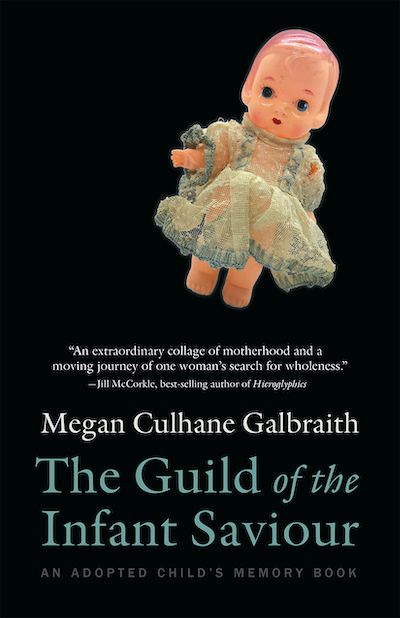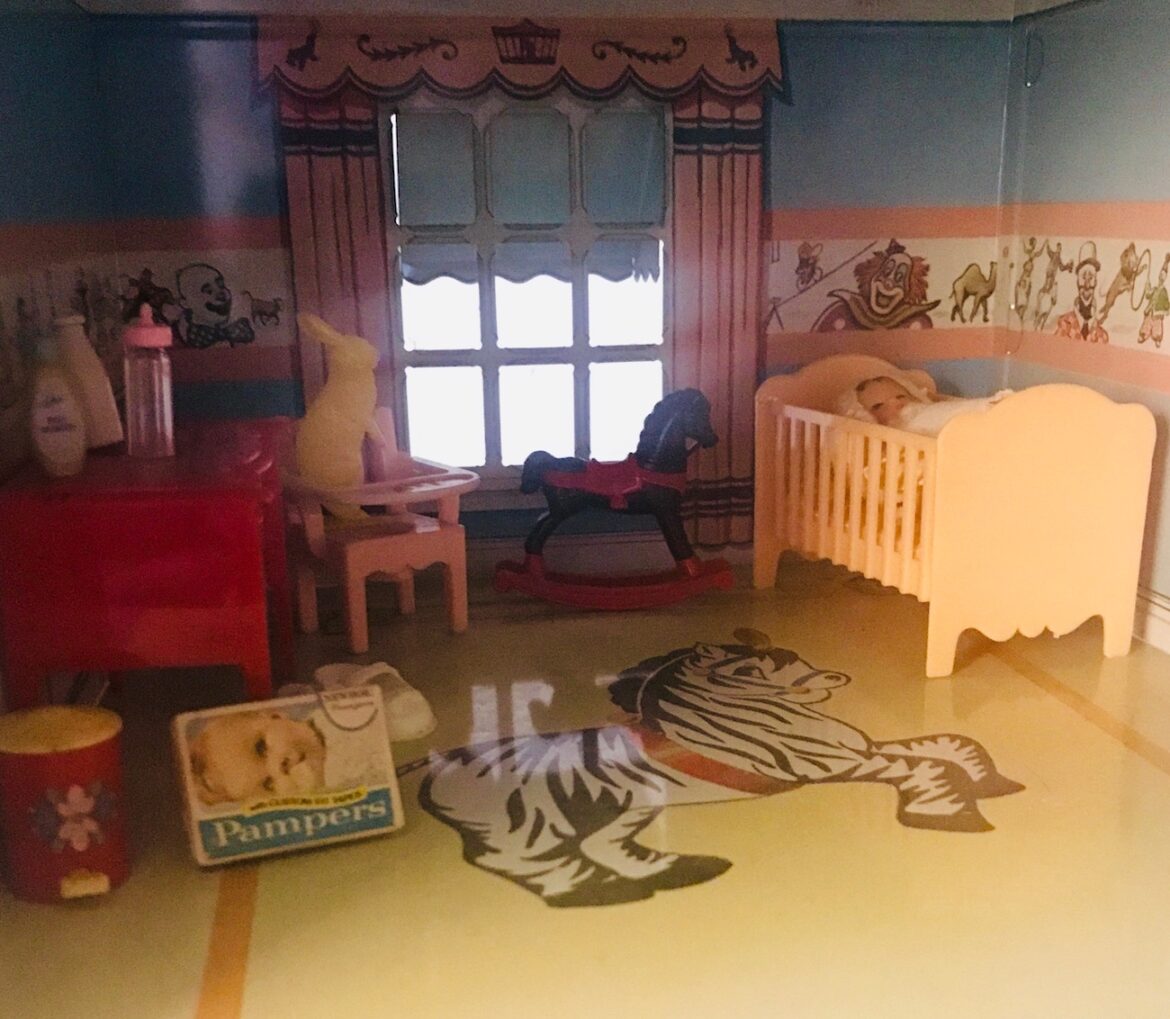An excerpt from Megan Culhane Galbraith's forthcoming book, The Guild of the Infant Saviour: An Adopted Child's Memory Book
 It’s not hyperbole to say I’ve never seen a book quite like Megan Culhane Galbraith’s extraordinary hybrid work of creative nonfiction, The Guild of the Infant Saviour: An Adopted Child’s Memory Book. Experimental in form and structure, it’s memoir, but at the same time a striking visual art project, an intellectual inquiry into the nature of memory, and a frightful window on the failures and brutalities of the American system of adoption.
It’s not hyperbole to say I’ve never seen a book quite like Megan Culhane Galbraith’s extraordinary hybrid work of creative nonfiction, The Guild of the Infant Saviour: An Adopted Child’s Memory Book. Experimental in form and structure, it’s memoir, but at the same time a striking visual art project, an intellectual inquiry into the nature of memory, and a frightful window on the failures and brutalities of the American system of adoption.
While each aspect is equally compelling, the emotional heart of the book is the origin story of a girl who had three mothers before she was half a year old and the experience of the woman she grew to be, who, only during her own pregnancy, was overwhelmed by need to know her history and learn about her first mother.
It’s written in a powerful voice that can veer from playful to mournful and lingers on wonder and curiosity. The language at turns is discursive, fragmented, stream of conscious, and deeply thoughtful. Although Galbraith expresses a unique sensibility, adoptees and others who have yearned to know about their origins will see themselves here. The author’s meditations on the nature of identity, her compulsion toward self-erasure, and her fear of abandonment likely will resonate.
Here, the author shares an excerpt from this exceptional book, which will be released on May 21, 2021. You can support Indie booksellers and pre-order The Guild of the Infant Saviour at bookshop.org.
BKJ
The Guild of the Infant Saviour, An Excerpt
She was nineteen when she gave birth to me. I’d lost my virginity when I was nineteen.
She was a Scorpio with brown hair, green/blue eyes, and fair/freckled skin. I’m a Scorpio with brown hair, green/blue eyes, and fair/freckled skin.
On the pages, in her halting and nearly unintelligible penmanship, I was struck by how much I identified with her. Even her handwriting resembled mine.
TALENTS, HOBBIES, SPECIAL INTERESTS
very organized
good singing voice
interest in the arts, dancing (ballet + modern)
acting, writing poetry, reading
FUTURE ASPIRATIONS
To be a magazine editor
———
It is incredible how few concrete details I needed to feel connected across time. We shared a mutual love of books, music, and dance. I’d begged my parents to let me play the violin beginning in fourth grade. I’d danced with The Royal Academy of Dance up until high school, written poetry, fiction, and essays, and spent so much time reading in solitude that my adoptive mother once asked, “Honey, don’t you want to go outside and play?”
On my father’s side, she’d listed no age, just that he was Caucasian and English. He was more than six feet tall with blue eyes, blond hair, and fair skin. In the sections for his interests and aspirations she noted:
TALENTS, HOBBIES, INTERESTS: ?
FUTURE ASPIRATIONS: ?
I began to think about who I was at nineteen—a virgin for starters—and how incomprehensible it would have been to become a mother when my own future felt like it was just beginning.
———
MANNER IN WHICH PLANS FOR THE CHILD’S FUTURE WERE MADE BY THE PARENTS. REASONS FOR CHILD BEING PLACED FOR ADOPTION:
Since the birth mother is unwed, she is receiving no support from the birth father and thinks it best for the child to be adopted by a stable, loving family to best offer the child all the advantages she is unable to give.
———
She didn’t receive prenatal care until she was five months pregnant according to the paperwork. And he was no saint, but she also seemed forthright and unashamed.
———
DRUGS TAKEN DURING PREGNANCY
Alcohol: AMOUNT: an occasional beer HOW OFTEN: once/twice a week
Marijuana: WHEN: first 4–5 months AMOUNT: total about 1 oz.
Cigarettes: WHEN: throughout AMOUNT: 10–15/daily
———
She’d updated the paperwork within the last ten years. Her mother, my grandmother, had taken a drug called Diethylstilbestrol (DES) during her pregnancy. DES was a synthetic form of estrogen given to women between 1940 and 1971 to prevent miscarriage. The daughters of women who used DES were forty times more likely to develop cancers of the cervix and vagina.
Medical terminology deemed them “DES Daughters.”
The drug’s side effects were known to skip a generation, meaning, they may have affected me—or worse my unborn child. Late-onset and irregular periods were one side effect for DES granddaughters like me. I didn’t get my period until I was sixteen: my biological mother got hers at around eleven. Other risks included infertility, cancer, congenital disabilities, and “fewer live births.”
I worked myself into a frenzy about this. I called my doctor; I demanded they double-check the health of my baby. I went to the library and researched the effects and side effects of DES. After I’d calmed myself, what struck me most was that my birth mother had cared enough to update my file.
One of my biggest fears about finding her was that she wouldn’t want to be found. But here she’d left a medical clue in these papers that signaled she was thinking about me. She’d left a Hansel and Gretel-like trail of breadcrumbs through the woods, as if willing me to find her.
So I did.
Megan Culhane Galbraith is a writer and visual artist. Her work was a Notable Mention in Best American Essays 2017, has been nominated for two Pushcart Prizes, and has been published in Tupelo Quarterly, Redivider, Catapult, Hobart, Longreads, and Hotel America, among others. She is associate director of the Bennington Writing Seminars and the founding director of the Governor’s Institutes of Vermont Young Writers Institute. Look for her on Twitter, on Instagram here and here, and on Facebook here and here.


